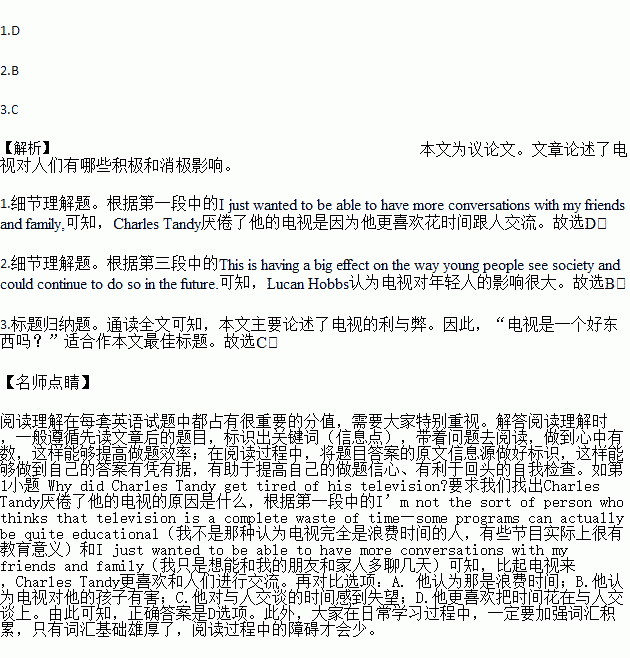题目内容
Last month, high school teacher Charles Tandy gave away his television. “I’m not the sort of person who thinks that television is a complete waste of time—some programs can actually be quite educational,” he says. “I just wanted to be able to have more conversations with my friends and family, and TV prevents you a lot of programs aren’t suitable for their children.
But some experts are now arguing that television is making the world a better place. Paul Wood, and Australian psychologist, has studied the effect of TV in many different countries. He says that educational programs don’t bring many benefits. However, popular different countries. He says that educational programs don’t bring many benefits. However, popular dramas about everyday life are helping to improve people’s lives in various ways. He says, for example, that such programs increase understanding about the sorts of problems that teenagers have, particularly ones that damage their education.
Lucan Hobbs, professor of media studies, says that the issues that surround TV may be even wider. “In some countries, popular music competitions and reality shows have made many people believe that anyone can be famous, even though this may not be true. This is having a big effect on the way young people see society and could continue to do so in the future.” He says.
There may be on final reason why people see TV differently. Over the last 50 or 60 years, the world has learned to deal with TV. We realize that I can bring a few benefits and we are no longer afraid of it. But now there is something else to consider—the Internet. By comparison, the gentle television set in the corner of every sitting room seems almost friendly.
1.Why did Charles Tandy get tired of his television?
A. He considered it to be a waste of time.
B. He thought television was bad for his children.
C. He was disappointed with his time talking to people.
D. He preferred to spend his time talking to people.
2.Lucan Hobbs thinks that television .
A. is making a lot of young people famous
B. has greatly affected young people
C. is turning the world into an unrealistic one
D. is becoming more popular with young people
3.What is the best title for the text?
A. How Television Works?
B. Is television a Social Media?
C. Is television a Good Thing?
D. How Television Won the Internet?

